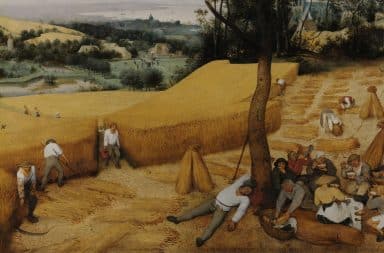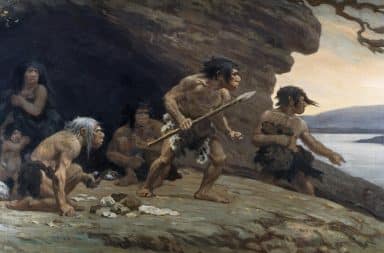>>> Bang for Your Buck
By staff writer David Nelson
January 1, 2006
Essential New Word of the Week: guacoma (definition hint: green-eyed)
In the beginning there was nothing. God said, “Let there be light!” And there was light. There was still nothing, but you could see it much better. Then, God created Heaven and Earth. No, it’s totally true! This guy even knocked on my door in order to tell me so. Then he hit me with a pie, honked a giant horn, and zoomed away on a unicycle. But if my research into creationism is correct, after that came plants and animals, followed by more complex things like ice cream sundaes and waterslides. But nowhere in the Bible does it say God created beer, and I think that’s pretty significant. I mean, even if you do believe that an angry, invisible man lives in the clouds, and he used to punish people for eating meat on Friday, you’re going to have a hard time explaining beer. For if God begat beer, and beer begat Girls Gone Wild™, and Girls Gone Wild™ begat a vigorous bout of masturbation last night, then clearly, God is endorsing the sinful coupling of hand and groin, not to mention the waste of my precious seed. No, this cannot be the case. Clearly, beer has a more terrestrial origin, and I’m going to share it with you.
Early man was rough and brutish, and I’m guessing early woman was not much better, in spite of Betty Rubble’s shapely thighs and luscious cave-breasts. But many thousands of years ago, humans lived nomadically, without such creature comforts as electronic foot massagers or reality television. After a while, they gave this up in order to settle into a more sedate, agricultural lifestyle. Grain was the first domesticated crop. And then, something magical happened…
“Historians believe it was the enslaved Hebrews of Babylon who thought to include hops. So, the whole slavery experience couldn’t have been all bad.”
One day, a bit of soggy barley accidentally came into contact with wind-borne yeasts, and began to ferment. I didn’t know there was such a thing as wind-borne yeasts, and frankly, it scares me. I place the blame squarely on women, the only ones able to harness mystical yeasty powers. In any case, early man likely said to himself, “Damn, this barley’s gone rotten. Better throw it out, I wouldn’t want to get sick.” At which point his more evolved neighbor might have said, “No so fast, Gronk. Let’s give it a chance and see what happens.” The next morning, head pounding like a paleolithic jackhammer, early man woke up (perhaps next to early woman) and decided that fermented barley was a good thing. Moreover, there might just be a way to induce fermentation, rather than waiting for another of Mother Nature’s accidents.
Thusly, beer was invented. And to ensure a steady supply of the delicious drink, it was necessary to cultivate more and more grain. This ensured that early man (and the early woman he now shacked up with after the world’s first beer goggle incident) didn’t go back to hunting and gathering. A side effect of this domestication was that early man began to wonder if grain and yeast held any more surprises. This, of course, indirectly led to the invention of such bread offshoots as cake, taco shells and, friend to drinkers everywhere, the sandwich.
So, it was beer that gave civilization its kick-start. Without beer, there would have been no agriculture, no science, no Renaissance, no Shakespeare, no video games, and no hilarious novelty singing fish. And make no mistake, early civilization really loved its beer, even though it probably tasted worse than fermented ostrich piss by today’s standards. The Mesopotamians, for example, took germinated barley cakes, and put them in jars of water to ferment. The result was a lumpy brew that had to be strained through a cloth in order to make it less chewy. Eh, I’m sure it still tasted better than Budweiser.
Apart from being lumpy, early beer lacked the distinctive hops we’re used to. Some historians believe that it was the enslaved Hebrews of Babylon who thought to include hops in the process. So, the whole slavery experience couldn’t have been all bad. Moreover, their recipe for beer was said to cure leprosy, which I find entirely plausible. How many drunken Jewish lepers do you run into on an average day? Not that many. Hops, by the way, are related to cannabis, which has led some risk-taking microbreweries to create hemp beer. It’s not that bad either, once you get it lit, which is the hard part.
Around that time, Hammurabi (formerly known as MC Hammurabi), an important Babylonian King, decreed a law that established a daily beer ration. This ration was dependent on the social standing of the individual. So, a normal worker received 2 liters, civil servants got 3 liters, and administrators and high priests received 5 liters per day. I think I speak for us all when I say: Holy shit. I’m sure that if Marty McFly and Doc Brown had been aware of this, they wouldn’t have wasted time fucking around in the 50’s, that’s for sure. Also, in these ancient times beer was often not sold, but used as barter. Since there were also slave girls available for barter, Babylonian men must have had to do some serious and difficult prioritizing.
The Egyptians carried on the tradition of beer brewing. They used unbaked bread dough for making beer, and they added dates to the brew to improve the taste. Remember that in case you’re ever on Alcoholic Jeopardy. Beer was kept in long clay pots that were pointed on one end so that they could be planted into the sand. So, we can thank the Egyptians for giving us the tall-boy. The importance of beer in ancient Egypt can be seen from the fact that scribes created an extra hieroglyph for “brewer.” It was later appropriated by the Milwaukee baseball franchise, along with the reanimated mummy of Robin Yount.
After the Greeks and Romans succeeded Egypt, beer continued to be brewed. At first, it was only brewed in the outer areas of the empire where wine was difficult to obtain. For the Romans, beer was considered a barbarian’s drink. But don’t judge them too harshly. Wrapped in their togas, they also decided that pants were for barbarians only, as well as beards. And even though I don’t currently have a beard, I wear pants almost every day. If I am a barbarian, I’m pretty sure that’s not the reason why.
As time marched on, brewing became a local enterprise. Inns brewed their own beer, much to the delight of anyone who has ever had the pleasure of joining the words “beer” and “wench.” Early commercial breweries sprang up where demand was highest. Later still, the discovery of pasteurization made beer easier to keep and therefore easier to transport. I forget who invented pasteurization, but I think it may have been Al Gore.
That brings us to the modern age. The production of beer is a complicated chemical process, and to meet demand, brewers have pretty much automated the entire process. No detail is overlooked. Modern bottles, for example, are usually brown, because beer scientists have determined that exposure to sunlight makes beer go skunky. So, that’s another thing my pasty white ass has in common with beer. Also, I’m gassy, and if given the chance, I produce a lot of head.
In any event, over the centuries beer has made quite a journey, from “lumpy” to “scientific.” Unfortunately, it seems to have reached the end of its evolutionary trail. Nowadays, a focus group is more likely to decide on a beer’s flavor than a brewmaster. Critical decisions are made by accountants and marketing guys, who probably prefer cocktails anyhow. It’s their loss. But next time you grab a beer, reflect for a moment on the land of Mesopotamia, and the swinging, anything-goes, beer-fueled party land it must surely have become.
Essential New Word of the Week:
 guacoma \gwa’koma\ n: A state of torpor, laziness, or inaction brought about by the over consumption of guacamole. Who doesn’t love guacamole? It’s zesty, it’s delicious, it even looks a little bit like some kind of animal poo. It’s probably the best non-pornographic thing you can do with an avocado. But eat too much, and you’re likely to suffer a guacoma. I have a friend who actively attempts to prevent guacomas at parties. He stations himself near the dips, empty chip at the ready, in order to knock some of the guacamole off of the chip of anyone who gets too ambitious. Now that’s service.
guacoma \gwa’koma\ n: A state of torpor, laziness, or inaction brought about by the over consumption of guacamole. Who doesn’t love guacamole? It’s zesty, it’s delicious, it even looks a little bit like some kind of animal poo. It’s probably the best non-pornographic thing you can do with an avocado. But eat too much, and you’re likely to suffer a guacoma. I have a friend who actively attempts to prevent guacomas at parties. He stations himself near the dips, empty chip at the ready, in order to knock some of the guacamole off of the chip of anyone who gets too ambitious. Now that’s service.


